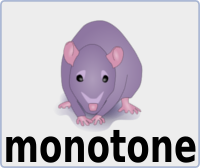This article has multiple issues. Please help improve it or discuss these issues on the talk page . (Learn how and when to remove these messages) |
| Monotone | |
|---|---|
 | |
| Developer | The monotone team |
| Initial release | April 6, 2003 |
| Final release | 1.1 [1] / May 4, 2014 |
| Repository | |
| Written in | C++ |
| Operating system | Unix, Linux, BSD, Mac OS X, Windows |
| Available in | English, Italian, Swedish, Portuguese, German, Spanish |
| Type | Revision control |
| License | GPL-2.0-or-later |
| Website | www |
Monotone is an open source software tool for distributed revision control. It tracks revisions to files, groups sets of revisions into changesets, and tracks history across renames. The focus of the project is on integrity over performance. [2] Monotone is designed for distributed operation, and makes heavy use of cryptographic primitives to track file revisions (via the SHA-1 secure hash) and to authenticate user actions (via RSA cryptographic signatures).
